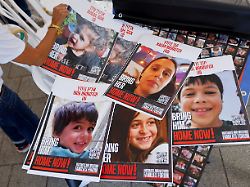Do not separate mothers from children
Israel gives new details about the hostage agreement
November 22, 2023, 5:05 p.m
Israel and Hamas negotiated for weeks and agreed to a four-day ceasefire. Many imprisoned Palestinians are to be released from Israeli prisons in exchange for some hostages kidnapped by Hamas. Israel is now announcing further parts of the agreement.
Israel has released further details on the agreement with Hamas on a ceasefire and the exchange of Israeli hostages for Palestinian prisoners. A maximum of ten days are planned for the entire exchange of up to 300 Palestinian prisoners for up to 100 live hostages from Israel, according to the published cabinet decision. After that, the Israeli army’s fight against Hamas and other Islamist extremists in the Gaza Strip should continue.
The first step is to exchange 50 Israeli hostages and 150 Palestinian prisoners within four days. The hostages and prisoners are to be released in four groups each. It was said that prisoners would be released in return for the handover of at least ten Israeli hostages to Israeli security forces. No number is mentioned in the document. There is also a 24-hour ceasefire.
In a second step, up to 50 additional Israeli hostages are to be exchanged for up to 150 additional Palestinian prisoners in groups similar to the first step. The Israeli news site Ynet also reported that under the agreement, Israel would be allowed to provide Hamas with the names of the 100 hostages to be released. Part of the deal should also be that abducted mothers and children are not separated from each other upon release.
According to an Israeli government spokesman, relatives of terror victims, among others, could appeal to the Supreme Court within 24 hours against the release of certain Palestinian prisoners. A group of terror victims wants to do this, according to Israeli media. However, the court is not expected to take action against the government’s decision.
“Excruciating” five-week negotiations
The Israeli cabinet approved the agreement brokered by Qatar on Wednesday night. The first significant diplomatic advance in the war between Israel and the radical Islamic Palestinian organization was greeted with great relief around the world.
The Israeli Cabinet’s vote on the deal was the final hurdle after what a U.S. official said was an “agonizing” five weeks of negotiations. It was “a difficult decision, but the right decision,” Prime Minister Benjamin Netanyahu told his ministers on Tuesday evening. In its right-wing religious coalition, criticism of concessions to Hamas had become loud.
The war was triggered by a major attack by Hamas on October 7th. On that day, hundreds of fighters from Hamas, classified as a terrorist organization by the USA and the EU, entered Israel and committed atrocities there, mostly against civilians. According to Israeli information, around 1,200 people were killed and around 240 people were taken hostage to the Gaza Strip. In response, Israel began attacking targets in the Gaza Strip from the air and ground.
A day’s ceasefire for ten released hostages
According to Hamas figures, which cannot be independently verified, more than 14,100 people have been killed in the Gaza Strip since then. The Israeli government has now said it will observe a four-day “pause” in ground, air and sea attacks on the Gaza Strip to facilitate the release of the hostages. The government said there would be an additional day of ceasefire for every additional ten hostages released.
At the same time, Israel assured that the agreed agreement does not mean the end of the war. For its part, Hamas confirmed “that our fingers remain on the trigger and our (…) battalions will continue to lie in wait.” In addition to the conflict parties in Israel and Gaza, the governments in Doha, Cairo and Washington, among others, were involved in the negotiations. Qatar plays a key role in mediating the release of hostages.
